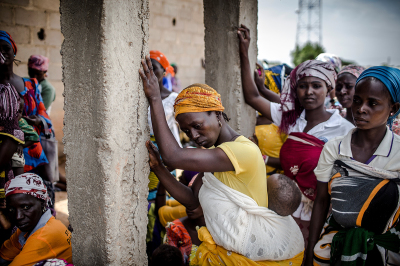
It didn’t matter how soundly she slept, Salamatu would wake up at 2 a.m. every night — her body remembering what her mind wished she could forget. It had been that same hour, months earlier, when Boko Haram stormed into her village, rewriting her future forever.
For Salamatu, terror was a way of life. In an earlier wave of violence, the jihadists had swarmed her Nigerian church, shooting the pastor in cold blood. Then, she says quietly, they came for her family. “My husband told me we should pray,” Salamatu remembers of that horrible night. “We said a short prayer and then ‘Amen.’ As soon as we said ‘Amen,’ we heard people pulling at the handles of our gate.” Quickly, her husband ushered her, the children, and grandchildren upstairs. “Don’t cry,” he told them. “Don’t make a noise — not even if you hear gunshots.” He walked outside to face the armed men, and it was the last time she saw him alive.
The militants jumped the fence and opened fire on her husband where he stood — killing him instantly. He was one of six victims that night and one of hundreds slaughtered every month in the bloody farmlands of Nigeria. Just this past weekend, as the world stopped to observe Palm Sunday, 51 people were massacred in an early morning attack on the community of Bassa — many burned to death in their homes by the savage Fulani herdsman.
In the days leading up to the holy day raid, the roaming bands of riders had mowed down Christians whose only crime was working their land. Another 11 were gathered around the freshly dug graves of other victims, only to be brutally murdered during the service themselves. A pregnant mother, a 10-year-old girl, and at least five women were among the dead. According to Open Doors, they are but a handful of the 113 innocents assassinated for their faith — and their land — across the Plateau State since the end of March.
“Our people are living in fear,” Titus Ayuba Alams wanted the West to know. “Children no longer go to school, even worship in churches — you can’t do it, because you are running for your life.” Still, most people understand the threat of openly worshipping Jesus and accept it anyway, determined to live out their faith in a country that’s become a killing field of Christians.
Even the landscape is scarred by the horrors. Across seven predominately Christian regions, houses are reduced to rubble and ash — signs of yet another Boko or Fulani rampage. The attackers destroy everything in their path, looting and setting fire to entire areas in a systematic genocide that the government sees but does nothing about. In this latest wave, more than 1,000 Christians have fled or been displaced, and almost 400 homes were annihilated — with only the sound of motorcycles to warn them danger is near.
“I would say it unapologetically, what happened in the last two weeks in Bokkos is genocide. I say it unreservedly,” Plateau Governor Caleb Mutfwang told Arise News last Monday. This, he argues emotionally, is “a well-coordinated plan to keep the people in those areas in perpetual poverty … [A]t the moment you are dealing with attackers that are faceless, and so you just leave it to the fact that this is ill-motivated and is aimed at driving the people out of their lands.”
Entire families have been “wiped out in midnight raids,” Pastor Tongsmangs Dasbak shook his head. “The indiscriminate killings often target defenseless civilians, including women, children and the elderly,” he emphasized. “…This loss of human life is not just a statistic but a profound tragedy that has disrupted the social fabric of the region.”
No one is brought to justice, no one is held to account. “Homes, schools, church buildings, and markets have been razed to the ground, as communities that took years to build have been reduced to ashes within hours,” Amnesty International reiterated. The lucky ones have run into the forests, unable — or unwilling — to return.
Some church leaders on the ground wonder if the latest wave of violence is retaliation for Bishop Wilfred Anagbe’s brave testimony before the U.S. House. “We’re very fearful for his life,” Congressman Chris Smith (R-N.J.), a lifelong religious freedom advocate, told Family Research Council President Tony Perkins on Monday’s “Washington Watch.” “The fact that the government has not stepped up to really robustly protect him [is appalling]. The threats that have been made are very real,” he cautioned. “… In his actual locale, a number of people have been killed recently — since April 3rd. We believe that’s more horrible message-sending by the terrorists.”
Perkins, who testified in the same House subcommittee on the terrorism against Nigeria’s Christians, listened as he told nightmarish stories of what’s happening to believers right under the government’s nose. “You sat right next to him when he gave his testimony, [in which he] made it clear that the Fulani are waging a jihadist war against Christians and pious Muslims,” Smith pointed out, “because they do kill Muslims too, people who don’t adhere to the very aggressive jihadist viewpoint. And there [are] more Christians who have died in Nigeria than any other country in the world.
Lela Gilbert, FRC’s senior fellow for International Religious Freedom, told The Washington Stand that there’s “no end to the abuse in sight.” “Church services are frequently targeted, whether Anglican, Catholic, or interdenominational Protestant. And the results are not only multiple deaths,” she warned, “but orphaned, raped, and often mutilated survivors. To many international observers, Nigeria is seen as a primary focal point of relentless Christian persecution.”
Pointing to other countries’ brutality, Smith said, “Yes, in China they put them in prison, and they torture them —but not as many die. Same way with North Korea. But here we’re talking about firebombing churches [and] individuals, killing priests. As we had our hearing, we brought up the fact that there was a priest who was summarily executed. And it’s just horrific bloodletting. The government in Abuja has not stepped up to the plate.”
Smith pointed to the International Religious Freedom Act, which makes it clear that “not only the actual complicity in working to hurt people of faith and to incarcerate and kill” is criminal, but also “if you stand with your hands in your pockets and allow people to do it as well, that too constitutes the designation for a country of particular concern. And then you are sanctionable. And there are many, many very serious sanctions that could be brought against that government.”
Ever since the Biden administration stripped Nigeria of its official status as a Country of Particular Concern (CPC) — without any justification whatsoever — the U.S. has been deprived of one of its most basic tools to hold the country’s leaders accountable. “We’re saying, ‘Designate Nigeria as a CPC … and then sanction them,’” Smith urged. Last month, the New Jersey Republican introduced a resolution this year to do exactly that. “The time has come. We’ve got to step up. I’ve been raising this issue, [and] I’m not the only one … [I]t’s outrageous.”
Originally published at The Washington Stand.
Suzanne Bowdey serves as editorial director and senior writer for The Washington Stand. In her role, she drafts commentary on topics such as life, consumer activism, media and entertainment, sexuality, education, religious freedom, and other issues that affect the institutions of marriage and family. Over the past 20 years at FRC, her op-eds have been featured in publications ranging from the Washington Times to The Christian Post. Suzanne is a graduate of Taylor University in Upland, Ind., with majors in both English Writing and Political Science.


















